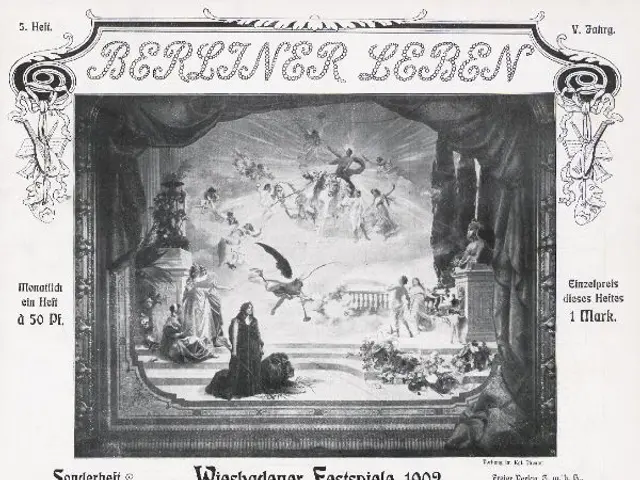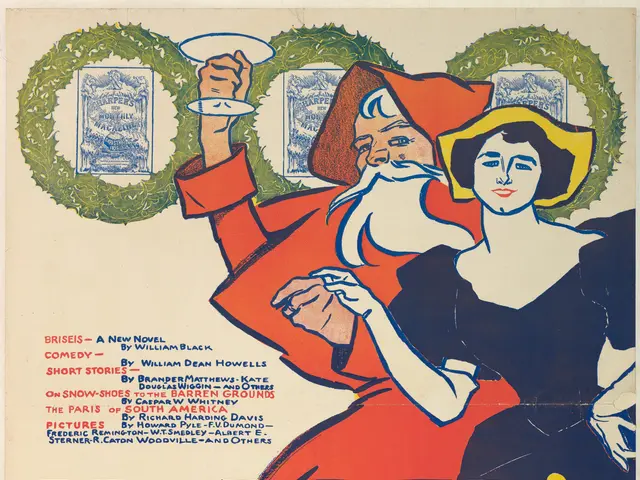Cinema's Role as a Political Soulmate
Exposing Politics Through Art: Indian Films Unveiling Political Truths
India's film industry has long been more than just catchy tunes and romance; it stands as a powerful voice in the political realm, fearlessly tackling corruption, power struggles, and political scandals. These films serve as mirrors to society, challenging us to confront uncomfortable truths and question the very nature of government and law.
"Indian Political Flicks Win Hearts and Minds" This Nov. 30, 2018 piece shows how streaming platforms and writers are stirring up a storm in world cinema with their gritty depictions of Indian political drama, captivating audiences and raising eyebrows.
From Quiet Protests to Loud Statements
1. Planting the Seeds: Early Resistance
Indian filmmakers have used their craft to silently protest against injustice since the 1950s. Films like "Do Bigha Zamin" (1953) and "Naya Daur" (1957) cleverly highlighted land exploitation and industrialization's impact on rural communities, respectively.
Yet, it was only during the Emergency period (1975-77) that political cinema burst out of the shadows. Directors like Govind Nihalani and Shyam Benegal paved the way for the Parallel Cinema movement, producing hard-hitting, realistic portrayals of bureaucracy and decay.
2. Modern-Day Cinema Heroes: Scandal Shepherds
In the 21st century, a new generation of politically charged films has emerged. These works delve deep into real-world controversies and political scandals:
- "Raajneeti" (2010) echoes the Mahabharata in the context of Indian elections.
- "Madras Cafe" (2013) paints a vivid picture of the Sri Lankan civil war and Rajiv Gandhi's assassination.
- "The Accidental Prime Minister" (2019) offers a dramatized biopic of Dr. Manmohan Singh rife with political undertones.
- "Tandav" (2021, web series) dives into university politics, caste identity, and power struggles.
Why Can't We Tear Ourselves Away from Political Scandals on Screen?
Credibility Crunch
Scandal-filled political films offer viewers an emotional outlet. When faced with issues too heavy to handle in real life, these films provide a means to process a sense of release.
Fact-Finding Forays in the Fog
With media credibility taking a hit, cinema often plays the role of an investigative journalist, filling in the gaps left by censored or biased news coverage.
The Shift to Issue-Driven Narratives
Today's audiences, especially the younger generation, crave issue-driven stories that tackle corruption, casteism, communal violence, and gender power abuse. Political cinema keeps up with this trend.
Headliners of the Political Spectrum
1. "Raajneeti" (2010) - The Modern Meta-mythology
Director: Prakash Jha Scandal: Electoral manipulation, political murders, nepotism.
A blend of Shakespearean tragedy and Indian mythology, Raajneeti presents a sweeping political saga involving a complex, morally ambiguous family embroiled in a power struggle. Its allegorical take on real-life Indian political dynasties makes for compelling viewing.
2. "Madras Cafe" (2013) - Spying and Moral Dilemma
Director: Shoojit Sircar Scandal: Covert operations, foreign policy blunders, terrorism.
This film paints a vivid picture of the Sri Lankan civil war and Rajiv Gandhi's assassination. Set against a backdrop of intrigue and underhanded deals, Madras Cafe sparked debates about the ethics of covert operations and the price of political power.
3. "The Accidental Prime Minister" (2019)
Director: Vijay Gutte Scandal: Power struggles, political machinations, misuse of democratic institutions.
This dramatized biopic about Dr. Manmohan Singh explores the complexities of political power and the tensions between elected leaders and the power brokers behind the scenes. The film stirred up controversy, with critics questioning the accuracy of its portrayal.
4. "Tandav" (2021)
Platform: Amazon Prime Scandal: Power struggles, caste politics, corrupt practices, surveillance.
A riveting web series that delves deep into campus politics, identity issues, and the destructive power of ambition, Tandav struck a raw nerve among viewers, reflecting India's polarized political climate. The series faced real-world controversy, including First Information Reports (FIRs) and calls for censorship.
5. "Article 15" (2019)
Director: Anubhav Sinha Scandal: Caste-based violence and police apathy.
Inspired by the Badaun rape case, Article 15 tackles caste discrimination head-on, shedding light on the systemic injustices that perpetuate historical disparities. The film challenged viewers to confront their biases and demand change.
Mirroring the Zeitgeist
Political films often gain popularity during national elections, protests, or crises, serving as cultural barometers. They help gauge public sentiment around key issues such as:
- Censorship and Free Speech: Backlash against Tandav and Udta Punjab illustrate mounting intolerance toward dissent and the growing push for stricter censorship.
- Youth Activism: Films like Haider and Rang De Basanti have activated young viewers, inspiring protests and activism.
- Social Media Frenzy: Controversial films spread quickly online, fueled by social media discourse and controversy.
The Benefits of Covid for Cinema
From an SEO and digital content perspective, articles and media centered on political drama in films tap into high-volume, low-competition long-tail keywords such as:
- "Indian political movies based on true stories"
- "Bollywood films on real-life scandals"
- "Best Indian political thrillers of the decade"
Capitalizing on these keywords can lead to high CTR headlines and content-rich articles that perform well in search rankings when paired with trending events or anniversaries.
Cinema as a Political Crash Course
Political films serve as supplemental educators, especially in a country where civic education is lacking. They help viewers understand:
- The functioning of the political system (or its failures)
- Why accountability is crucial
- The roles of institutions like CBI, ED, EC, etc.
They also inspire viewers to become more critical thinkers, promoting debates, grassroots movements, and policy discussions.
The Future of Political Storytelling
AI-Driven Storytelling
AI technologies such as deepfake technology or AI-powered reenactments are being utilized to dramatize real events with shocking realism. Filmmakers are also exploring the potential of generative AI to develop alternative political histories or simulate hypothetical scandals.
Data-Driven Productions
Streaming platforms are relying on data analysis to greenlight politically themed content. If audience metrics favor scandal-rich dramas, such films can expect continued investments in this genre.
Technological Convergence
Advancements in automated dubbing, subtitle generation, and targeted distribution have enabled political films to transcend regional and linguistic boundaries, reaching wider audiences and gaining further reach.
The Screen as the New Parliament
In a period marked by disputed truth and fragmented media narratives, Indian political cinema functions as both a lens and loudspeaker. These films dramatize events and the emotions, ideologies, and conflicts that compose a nation, and serve as platforms for public participation in democracy.
By watching these films, audiences don't just consume entertainment; they engage in civic discourse, offering valuable insights, critique, and sometimes, yes, hope.
Frequently Asked Questions (FAQ)
Q1: Are Indian political films based on real events?
Yes, many Indian political films draw direct or indirect inspiration from real-life events, scandals, assassinations, elections, and controversies.
Q2: Do these films face censorship or legal issues?
Often, yes. Films like Tandav, Udta Punjab, and The Accidental Prime Minister have faced both censorship demands and legal trouble, including FIRs and public boycotts.
Q3: Why are political films seeing a resurgence in popularity?
The rise of streaming platforms, increased public interest in socio-political issues, and greater access to controversial content have contributed to a resurgence in political film popularity.
Q4: Which Indian political film should I start with?
Consider starting with Article 15 for a powerful exploration of caste discrimination, or dive into the political intrigue of Raajneeti. For films based on real-life scandals, check out Madras Cafe or Tandav.
- The emergence of gritty political dramas on streaming platforms has stirred up a storm in world cinema, captivating audiences and raising eyebrows, as detailed in the article "Indian Political Flicks Win Hearts and Minds."
- A compelling newly released web series, "Tandav," delves into university politics, caste identity, and power struggles, magnetizing viewers and eliciting controversy.
- Movies like "The Accidental Prime Minister" and web series such as "Tandav" offer issue-driven narratives that tackle political corruption, casteism, and gender power abuse, catering to today's audiences' preference for socially relevant stories.
- The popularity of politically charged Indian films has soared as they serve as cultural barometers, offering insights into emerging issues such as censorship, youth activism, and social media discourse.







